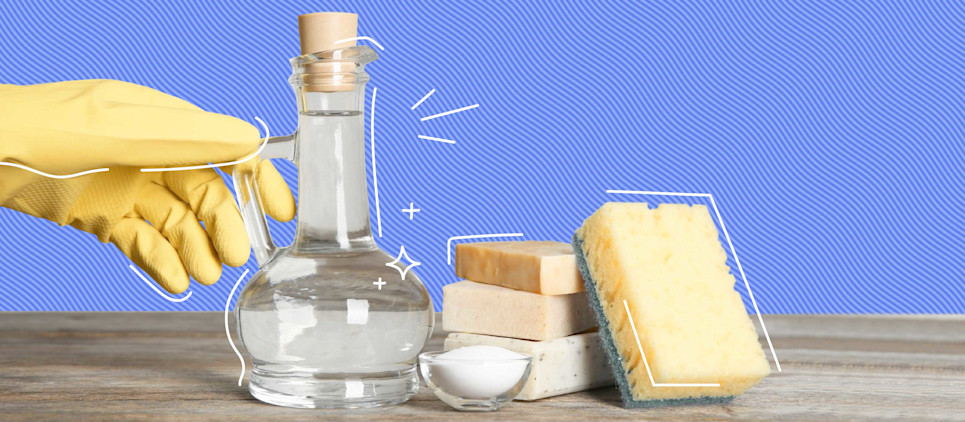Is vinegar a disinfectant?
If you’ve seen our home deep cleaning guide, you know that common white vinegar is a cleaner that we use often—and it’s great. It’ll bubble with a little baking soda to help you clean through grime without any harsh chemicals.
But there’s a technical difference between cleaning, sanitizing, and disinfecting. When you need your cleaning products to kill bacteria and viruses, it’s important to fully understand that difference. Vinegar might have some “disinfectant-like qualities,” but it doesn’t have the official status as a disinfectant approved by the Environmental Protection Agency (EPA). That means: vinegar isn’t going to disinfect to the level you need for a safe and healthy home.

Table of contents
What is a disinfectant?Vinegar’s disinfectant qualitiesCleaning with vinegar—will it kill COVID-19?Vinegar vs. tea tree oilVinegar vs hydrogen peroxideWhat commercial disinfectants are more effective than vinegar? How to disinfect in 3 easy stepsWhat is a disinfectant?
According to the EPA’s public health standards, when used properly an effective disinfectant will completely kill all germs on a surface and can help lower the risk of spreading infectious diseases, bacteria, and viruses. Disinfectants are used to clean surfaces that come in contact with lots of dangerous germs that people can spread through touch and bodily fluids. To become an EPA-registered disinfectant, the product must be able to kill 100% of bacteria, viruses, and funghi when used for the required contact time. Vinegar is not on that list.
Vinegar’s disinfectant qualities
Although it is not on the list of registered disinfectants, vinegar does have some disinfecting qualities. Vinegar is a solution of acetic acid and water. According to a study by the University of North Carolina, acetic acid can lower the amount of bacteria and viruses on a surface, but it cannot lower them by 99.999%, as required by the EPA. The study also showed that household disinfectants made with bleach or alcohol solutions greatly outperform vinegar at killing germs.
One 2016 study showed that vinegar combated E. coli bacteria and Norovirus when tested on leafy greens. That means that vinegar can weaken both bacteria and viruses but it doesn’t have the properties to completely disinfect.
Cleaning with vinegar—will it kill COVID-19?
Like the process of cleaning, vinegar can lift or break down some bacteria and viruses along with the dirt and debris it removes. But to eliminate a virus like SARS-CoV-2 (the virus that causes COVID-19), you’ll need to disinfect with a product that kills viruses completely, rather than simply reducing the amount of germs. Compared to disinfectant products, vinegar will not do as good of a job and it will not kill SARS-CoV-2 viral pathogens.

Vinegar vs. tea tree oil
Vinegar is partly such a popular cleaning product because it is a natural and environmentally friendly product. Tea tree oil is another natural product often used for cleaning and is made from the leaves of the Melaleuca tree.
Like vinegar, tea tree oil is not on the EPA’s list of registered disinfectants, but it does have some disinfecting qualities. It is naturally antibacterial (kills bacteria) and antifungal (kills fungus) but not all types, and again, not by 99.99%. Add a little to your next batch of all purpose vinegar and water cleaning solution for its fresh scent and an antibacterial boost.

Vinegar vs hydrogen peroxide
Hydrogen peroxide breaks down into two harmless parts—water and oxygen. Together, they make an effective disinfectant that is on the EPA’s registered list. The Centers for Disease Control states that, “commercially available 3% hydrogen peroxide is a stable and effective disinfectant” when used on hard surfaces. To kill the common cold, 3% hydrogen peroxide has a contact time of 6-8 minutes. For information about the contact time of hydrogen peroxide-based disinfectants to kill SARS-CoV-2, consult the EPA’s website.
What commercial disinfectants are more effective than vinegar?
All of them! Since vinegar didn’t make the EPA’s list, every product that did is a product you can count on more than vinegar. The most common commercial disinfectants have an alcohol or bleach base. The EPA’s list indicates which specific viruses—such as SARS-CoV-2, Rhinovirus (evil head cold), and Hepatitis A—are effectively eliminated by specific disinfection products. Here are a few that you’ll likely find at the grocery or superstore:
Lysol® Disinfecting Wipes
Clorox Disinfecting Wipes
Clorox Multi Surface Cleaner + Bleach
Scrubbing Bubbles® Bathroom Disinfectant Bathroom Grime Fighter
PURELL Professional Surface Disinfectant Wipes
White vinegar is a great multipurpose cleaner for your home but when you need to disinfect surfaces, use a cleaning product that meets the EPA’s standards. Every cleaning product that made the EPA’s list has an EPA registration number, which you can input on their website to learn which bacteria and viruses the product will kill.
How to disinfect in 3 easy steps
Always follow this three-step process when you need to clean and disinfect.
Wear gloves to protect your hands.
Clean the surface with soap and water first.
Follow with an approved disinfectant, letting it sit for the proper contact time.
Looking for a home where monthly cleaning is always on the books? Bungalow offers private rooms in shared homes that are more affordable than solo housing options in the same neighborhoods. Wifi, utilities, and monthly cleaning are set up before you move in so that communal living is seamless. Find a Bungalow near you.
Ready to find your next home?
Move-in ready homes and a built-in community so you can feel at home, together — wherever you are.
Suggested articles



